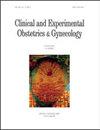血清血管内皮生长因子水平对卵巢子宫内膜异位症术后复发的预测价值
IF 0.6
4区 医学
Q4 OBSTETRICS & GYNECOLOGY
引用次数: 0
摘要
背景:子宫内膜异位症术后复发仍然是一个问题。本研究旨在研究基线血清血管内皮生长因子(VEGF)水平是否可以预测子宫内膜异位症术后复发。方法:纳入某三级医院2017 - 2019年腹腔镜子宫内膜瘤切除术及术后促性腺激素释放激素激动剂加回治疗的147例卵巢子宫内膜异位症患者。根据2年内子宫内膜异位症复发情况将患者分为两组,比较术前基线血清VEGF水平。采用Logistic回归检验基线血清VEGF水平与子宫内膜异位症复发的相关性,并计算受试者工作特征曲线下面积(AUC),检验其预测效果。结果:患者的平均年龄为30.1±6.0岁,痛经持续时间为60.3±35.0个月,多数(88.4%)为经修订的美国生育学会(rAFS) III期或IV期。8例(5.44%)患者在2年内复发子宫内膜异位症。与无复发患者相比,复发患者明显年轻化(25.9±4.3岁比30.3±6.0岁,p = 0.040),血清VEGF基线水平较高(689.67±127.38岁比547.87±171.31 pg/mL, p = 0.023),但其他基线特征无差异。在调整其他基线特征后,血清VEGF水平与子宫内膜异位症复发显著相关(比值比为1.008 / pg/mL, 95%置信区间为1.001-1.014)。血清VEGF水平预测子宫内膜异位症术后复发的AUC为0.741(95%可信区间0.594-0.887)。结论:基线血清VEGF水平是子宫内膜异位症术后复发的独立危险因素,可用于预测子宫内膜异位症复发。本文章由计算机程序翻译,如有差异,请以英文原文为准。
Predictive Value of Serum Vascular Endothelial Growth Factor Level for Postoperative Endometriosis Recurrence in Patients with Ovarian Endometriosis
Background: Postoperative recurrence remains a problem for endometriosis. The study aimed to study whether baseline serum vascular endothelial growth factor (VEGF) levels can predict postoperative endometriosis recurrence. Methods: We included 147 patients with ovarian endometriosis who received laparoscopic endometrioma excision and postoperative gonadotropin-releasing hormone agonist treatment with hormonal add-back therapy between 2017 and 2019 in a tertiary hospital. According to endometriosis recurrence within 2 years, the patients were divided into two groups and baseline serum VEGF level measured before the surgery were compared. Logistic regression was used to examine the association between baseline serum VEGF level and endometriosis recurrence, and the area under the receiver operating characteristic curve (AUC) was calculated to examine its predictive performance. Results: The mean age of the patients was 30.1 ± 6.0 years with a duration of dysmenorrhea of 60.3 ± 35.0 months before surgery, and the majority (88.4%) were with revised American Fertility Society (rAFS) stage III or IV. Eight (5.44%) patients had endometriosis recurrence within 2 years. Compared with patients without recurrence, patients with recurrence were significantly younger (25.9 ± 4.3 vs. 30.3 ± 6.0 years, p = 0.040) and had higher baseline serum VEGF levels (689.67 ± 127.38 vs. 547.87 ± 171.31 pg/mL, p = 0.023), but there was no difference in other baseline characteristics. Serum VEGF levels were significantly associated with endometriosis recurrence (odds ratio 1.008 per pg/mL increase, 95% confidence interval 1.001–1.014) after adjusting for other baseline characteristics. The AUC of serum VEGF levels for predicting postoperative endometriosis recurrence was 0.741 (95% confidence interval 0.594–0.887). Conclusions: Baseline serum VEGF level is an independent risk factor of postoperative endometriosis recurrence and might be useful for predicting endometriosis recurrence.
求助全文
通过发布文献求助,成功后即可免费获取论文全文。
去求助
来源期刊
CiteScore
0.50
自引率
0.00%
发文量
241
审稿时长
1 months
期刊介绍:
CEOG is an international, peer-reviewed, open access journal. CEOG covers all aspects of Obstetrics and Gynecology, including obstetrics, prenatal diagnosis, maternal-fetal medicine, perinatology, general gynecology, gynecologic oncology, uro-gynecology, reproductive medicine, infertility, reproductive endocrinology, sexual medicine. All submissions of cutting-edge advances of medical research in the area of women''s health worldwide are encouraged.

 求助内容:
求助内容: 应助结果提醒方式:
应助结果提醒方式:


